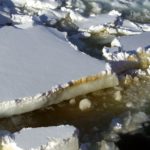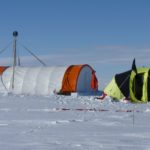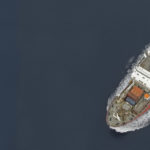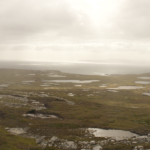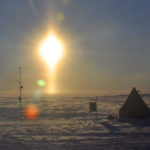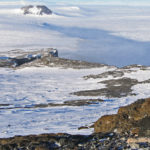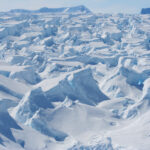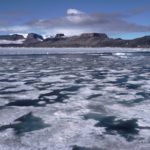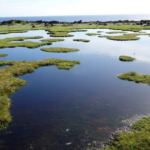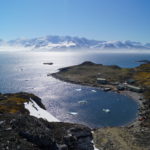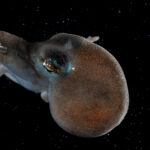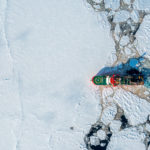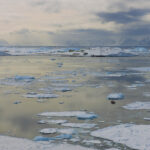The Antarctic is a pivotal part of the Earth’s climate system and a sensitive barometer of environmental change. Although remote and inhospitable, Antarctica is Earth’s most powerful natural laboratory. Understanding how the Antarctic is responding to current climate change – and what the continent was like in the past – is essential if scientists are to be able to more accurately predict future climate change and provide accurate information to politicians and policy makers.
British Antarctic Survey (BAS) has for the past 60 years been responsible for most of the UK’s scientific research in Antarctica and its current five-year research strategy is focussed on deepening our understanding of climate change.
Antarctic ice cores reveal the clearest link between levels of greenhouse gases in the atmosphere and the Earth’s temperature. They show that the temperature of the climate and the levels of greenhouse gases are intimately linked. In 2004, ice core scientists at BAS working together with colleagues from other European nations successfully extracted a three-kilometre ice core from the Antarctic. This core contains a record of the Earth’s climate stretching back 800,000 years – giving us by far the oldest continuous climate record yet obtained from ice cores.
BAS geologists can look back even further in time. By studying Antarctic rocks and sediments from the sea and lake beds, they are able to get a picture of what the Antarctic was like millions of years ago when the continent was warm and supported plants and animals such as dinosaurs. Understanding how the ice sheets that currently cover the continent developed and how they have receded in the past is essential if we are to be able to predict how those ice sheets will behave in a warmer world.
Much of BAS science is done on the Antarctic Peninsula – one of the fastest warming parts of the planet. BAS glaciologists are also studying the West Antarctic Ice Sheet, parts of which are thinning rapidly. Their work is crucial to understanding whether this thinning could signal the start of the ice sheet’s collapse, an event that would cause sea levels to rise much more than currently predicted.
On sea as well as on land, BAS scientists are investigating climate change. As the waters warm around Antarctica, ecologists at BAS are looking at how penguins, seals and the other species that make up one of the world’s largest marine ecosystems are responding.
Because the causes and effects of climate change are extraordinarily complex, assembling all the pieces of the climate change jigsaw is a huge challenge. By conducting world-class science in the Antarctic, BAS is making a significant contribution to meeting this challenge.
The cause of the variability in atmospheric CO2 over glacial-interglacial timescales has been a puzzle since its discovery in the early 1980s. It is widely believed to be related to …
Sea-ice is frequently cited as a likely driver and propagator of abrupt climate change because of the rapid and far-reaching impact of its feedbacks. However, numerical climate models are still …
During the Last Interglacial (129-116 thousand years ago, ka) CO2 and global temperature were both higher than they were before human industrialisation. By examining Last Interglacial climate, we thus gain …
The Antarctic Peninsula and West Antarctica have warmed dramatically in recent decades, with some climate records indicating that these are among the most rapidly warming regions on Earth. The Antarctic …
Changes in wind strength and circulation patterns above the Antarctic Peninsula are linked to its warming and increased upwelling of warm circumpolar deep water, resulting in accelerated melting and thinning …
In order to assess the impact of anthropogenic carbon dioxide (CO2) on the oceans today we are investigating the effect of decreasing upper ocean pH on calcifying zooplankton. Pteropods, …
This research focuses on investigating the glacial histories of Arctic ice sheets and ice caps using the marine geological record preserved on continental margins. By reconstructing past ice sheets, their …
In this NERC-funded project, we are generating Southern Hemisphere Westerlies (SHW) proxy records from each of the three major sectors of the Southern Ocean, focusing on subantarctic islands situated in …
The polar ice sheets play a major role in controlling Earth’s sea level and climate, but our understanding of their history and motion is poor. The biggest uncertainty in predicting …
This project will reconstruct millennial-scale ice sheet change in the western Amundsen Sea Embayment, Antarctica, using high-precision exposure dating.
Page 4 of 5«
1
2
3
4
5
»Last »
1 June, 2023
Concern is rising about tipping points in the Antarctic region (Armstrong et al., 2022). Recent heatwaves, changes in the Southern Ocean, and a reduction in the extent of Antarctic sea …
27 October, 2022
Introduction Understanding Antarctic warming and its consequences is vitally important for our planet. Parts of Antarctica, including the Antarctic Peninsula and West Antarctica, have experienced significant warming over the last …
Page 1 of 1381
2
3
…
138
»Last »
2 May, 2024
This week (Thursday 2 May), British Antarctic Survey (BAS) is inviting the public to become ‘penguin detectives’ and spend five minutes counting emperor penguins to help with vital research into …
29 April, 2024
British Antarctic Survey, in partnership with the University of Cambridge, will be at the 2024 Royal Society Summer Science Exhibition, showcasing how, using Antarctic ice cores to unlock the past, we …
25 April, 2024
Record low levels of Antarctic sea-ice in late 2023 resulted in breeding failures in a fifth of the continent’s emperor penguin colonies, according to a new study from British Antarctic …
14 February, 2024
Communities of microorganisms at the bottom of polar lakes evolved independently from other regions, influenced by the particular geological, biological and climate history of their regions. The unique character of …
23 January, 2024
Scientists at British Antarctic Survey have found that the number of warm weather events in the South Orkney Islands have significantly increased in frequency over the last 75 years. Using …
9 January, 2024
Congratulations to British Antarctic Survey (BAS) staff who have been awarded a Polar Medal in the 2024 New Year’s Honours List for their contributions to improving our understanding of Antarctica …
22 December, 2023
Scientists, including from British Antarctic Survey, have used octopus DNA to discover that the West Antarctic Ice Sheet (WAIS) likely collapsed during the Last Interglacial period around 120,000 years ago …
20 November, 2023
A team of international researchers set sail on the RRS Sir David Attenborough today (20 November) to answer some of the big questions about how Antarctic ecosystems and sea ice …
8 November, 2023
A research mission to Antarctica will study the effects of global warming on the West Antarctic ice sheet. The mission is part of an international research programme, which includes researchers …
23 October, 2023
The West Antarctic Ice Sheet will continue to increase its rate of melting over the rest of the century, no matter how much we reduce fossil fuel use, according to …
Page 1 of 161
2
3
…
16
»Last »

